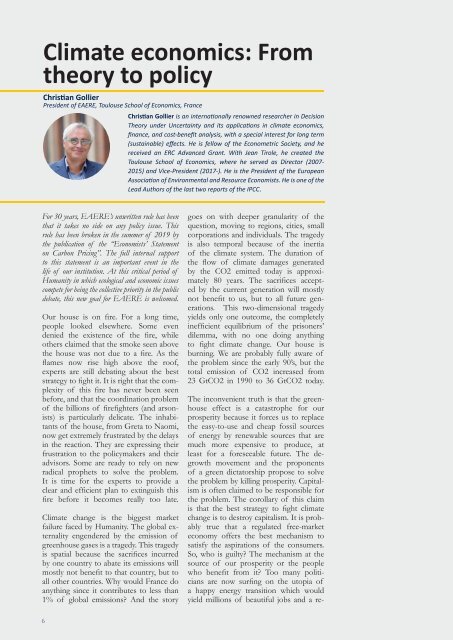EAERE Magazine - n.8 Winter 2020
You also want an ePaper? Increase the reach of your titles
YUMPU automatically turns print PDFs into web optimized ePapers that Google loves.
Climate economics: From<br />
theory to policy<br />
Christian Gollier<br />
President of <strong>EAERE</strong>, Toulouse School of Economics, France<br />
Christian Gollier is an internationally renowned researcher in Decision<br />
Theory under Uncertainty and its applications in climate economics,<br />
finance, and cost-benefit analysis, with a special interest for long term<br />
(sustainable) effects. He is fellow of the Econometric Society, and he<br />
received an ERC Advanced Grant. With Jean Tirole, he created the<br />
Toulouse School of Economics, where he served as Director (2007-<br />
2015) and Vice-President (2017-). He is the President of the European<br />
Association of Environmental and Resource Economists. He is one of the<br />
Lead Authors of the last two reports of the IPCC.<br />
For 30 years, <strong>EAERE</strong>’s unwritten rule has been<br />
that it takes no side on any policy issue. This<br />
rule has been broken in the summer of 2019 by<br />
the publication of the “Economists’ Statement<br />
on Carbon Pricing”. The full internal support<br />
to this statement is an important event in the<br />
life of our institution. At this critical period of<br />
Humanity in which ecological and economic issues<br />
compete for being the collective priority in the public<br />
debate, this new goal for <strong>EAERE</strong> is welcomed.<br />
Our house is on fire. For a long time,<br />
people looked elsewhere. Some even<br />
denied the existence of the fire, while<br />
others claimed that the smoke seen above<br />
the house was not due to a fire. As the<br />
flames now rise high above the roof,<br />
experts are still debating about the best<br />
strategy to fight it. It is right that the complexity<br />
of this fire has never been seen<br />
before, and that the coordination problem<br />
of the billions of firefighters (and arsonists)<br />
is particularly delicate. The inhabitants<br />
of the house, from Greta to Naomi,<br />
now get extremely frustrated by the delays<br />
in the reaction. They are expressing their<br />
frustration to the policymakers and their<br />
advisors. Some are ready to rely on new<br />
radical prophets to solve the problem.<br />
It is time for the experts to provide a<br />
clear and efficient plan to extinguish this<br />
fire before it becomes really too late.<br />
Climate change is the biggest market<br />
failure faced by Humanity. The global externality<br />
engendered by the emission of<br />
greenhouse gases is a tragedy. This tragedy<br />
is spatial because the sacrifices incurred<br />
by one country to abate its emissions will<br />
mostly not benefit to that country, but to<br />
all other countries. Why would France do<br />
anything since it contributes to less than<br />
1% of global emissions? And the story<br />
goes on with deeper granularity of the<br />
question, moving to regions, cities, small<br />
corporations and individuals. The tragedy<br />
is also temporal because of the inertia<br />
of the climate system. The duration of<br />
the flow of climate damages generated<br />
by the CO2 emitted today is approximately<br />
80 years. The sacrifices accepted<br />
by the current generation will mostly<br />
not benefit to us, but to all future generations.<br />
This two-dimensional tragedy<br />
yields only one outcome, the completely<br />
inefficient equilibrium of the prisoners’<br />
dilemma, with no one doing anything<br />
to fight climate change. Our house is<br />
burning. We are probably fully aware of<br />
the problem since the early 90’s, but the<br />
total emission of CO2 increased from<br />
23 GtCO2 in 1990 to 36 GtCO2 today.<br />
The inconvenient truth is that the greenhouse<br />
effect is a catastrophe for our<br />
prosperity because it forces us to replace<br />
the easy-to-use and cheap fossil sources<br />
of energy by renewable sources that are<br />
much more expensive to produce, at<br />
least for a foreseeable future. The degrowth<br />
movement and the proponents<br />
of a green dictatorship propose to solve<br />
the problem by killing prosperity. Capitalism<br />
is often claimed to be responsible for<br />
the problem. The corollary of this claim<br />
is that the best strategy to fight climate<br />
change is to destroy capitalism. It is probably<br />
true that a regulated free-market<br />
economy offers the best mechanism to<br />
satisfy the aspirations of the consumers.<br />
So, who is guilty? The mechanism at the<br />
source of our prosperity or the people<br />
who benefit from it? Too many politicians<br />
are now surfing on the utopia of<br />
a happy energy transition which would<br />
yield millions of beautiful jobs and a re-<br />
6<br />
6













